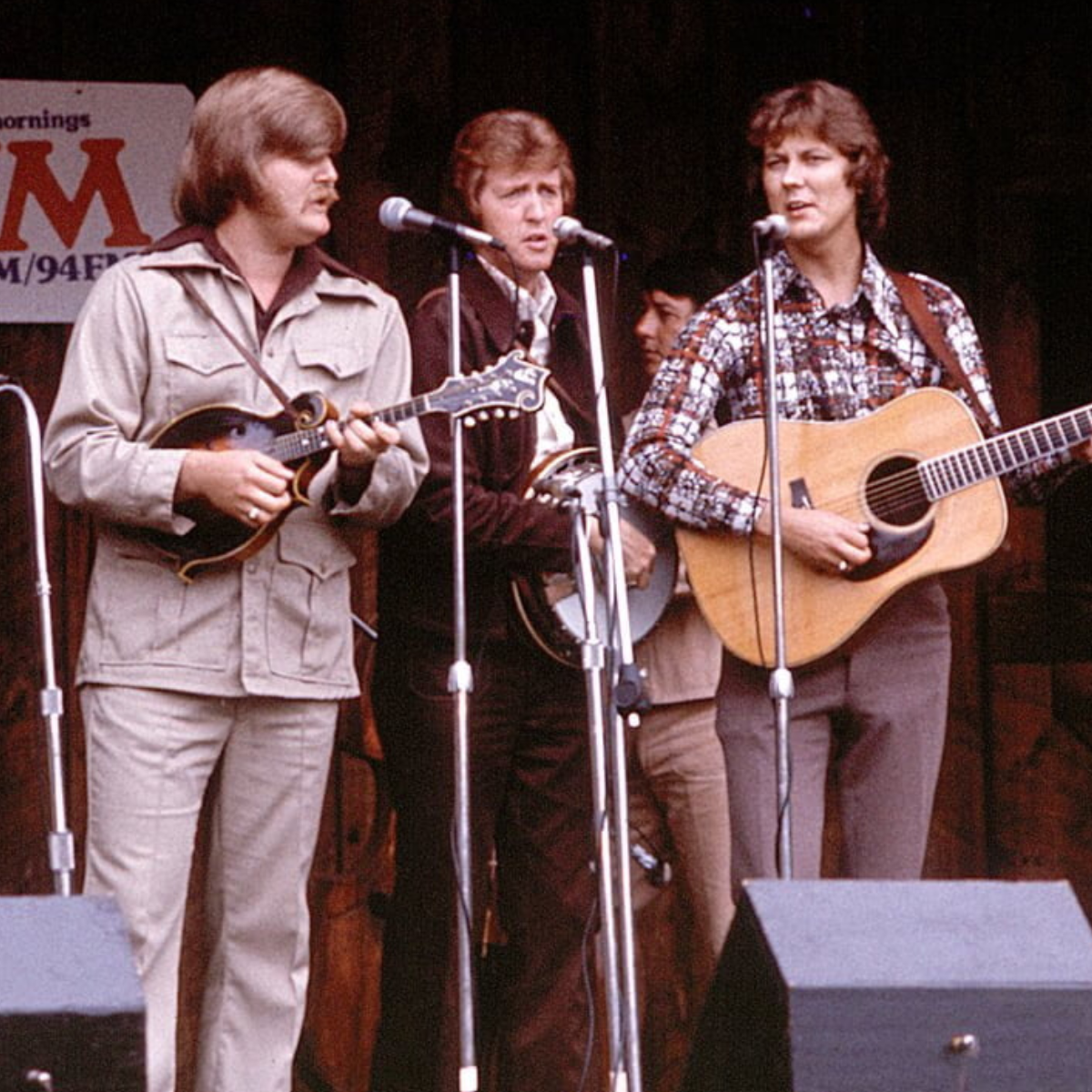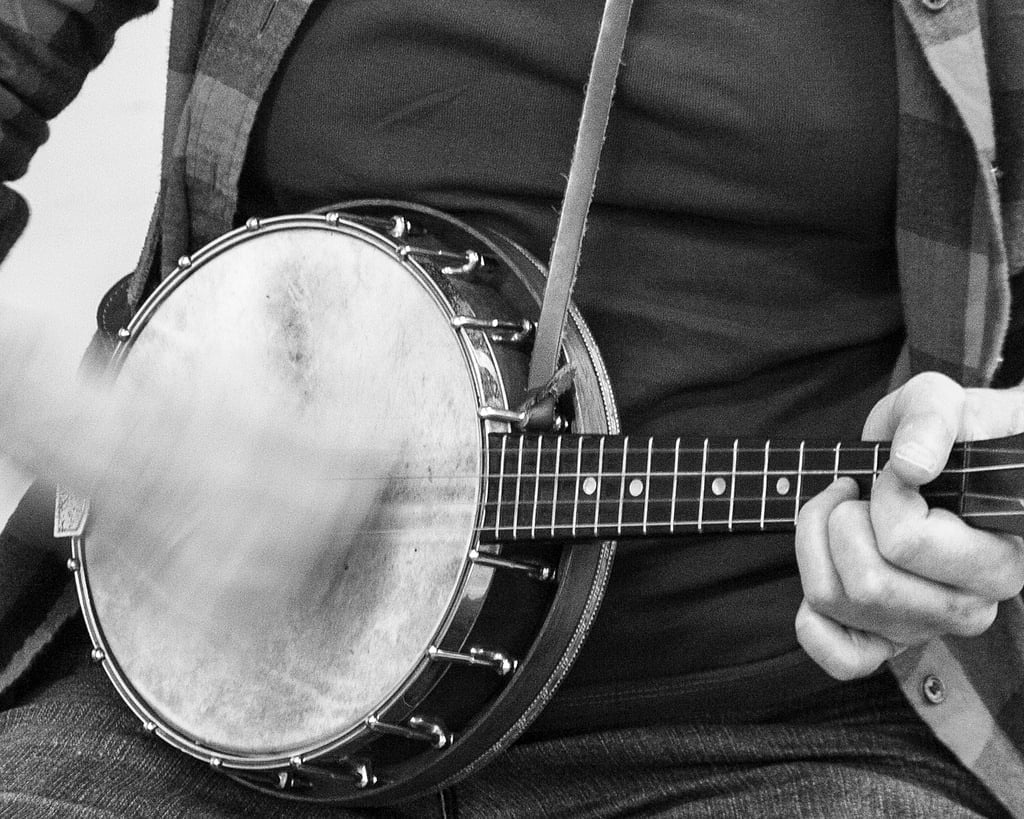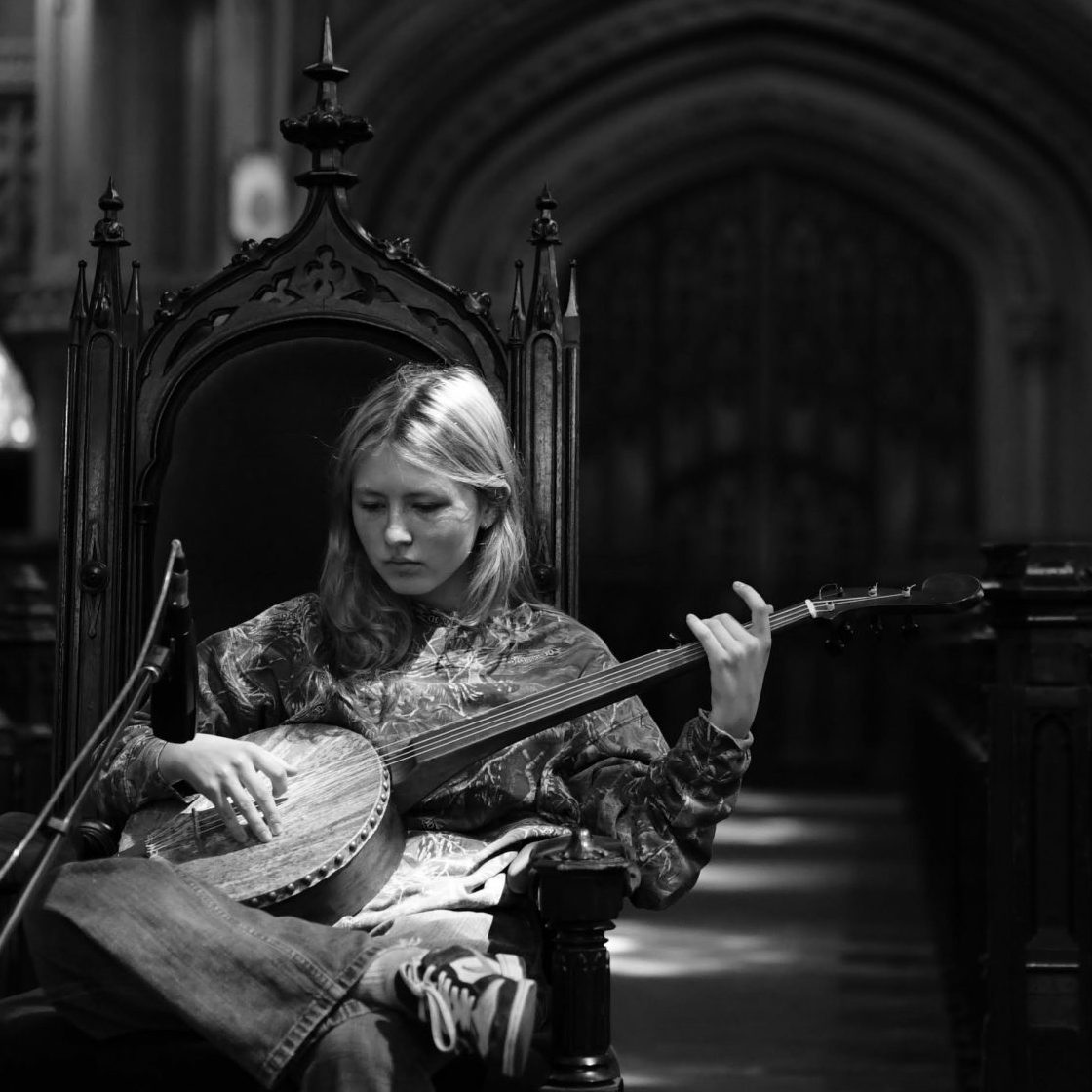Mipso’s new album, Book of Fools, pushes and pulls away from and toward the band’s sense of home, musically and geographically. There is a kinetic energy in this collaboration that is only achieved from years (10, to be precise) of hard-won work and the evolution of four people who choose each other. Though their sonic palate has shifted from earlier folk and bluegrass influences, this is less of a sea change and more a showcase of transformation and exploration amongst a group that has purposely allowed itself the space to shift.
Speaking with members Wood Robinson, Libby Rodenbough, Jacob Sharp, and Joseph Terrell is a fresh reminder that a band, no matter how harmonious their music may be, consists of individual humans with their own needs, their own ideas of home, and their own personal evolutions. Bands that survive and thrive through the grueling work of creation to commerce are those that carve out the space for people to move and change and shapeshift.
BGS reached Wood and Jacob via Zoom in their homes – in Salt Lake City and Los Angeles, respectively – and some days later spoke with Libby and Joseph on the phone from a van in Virginia at the start of their tour.
BGS: You all clearly have so much reverence for North Carolina as home base but you’ve also shifted around a lot, geographically. How have the changes of being rooted in one place, but then shifting around affected the music and how you operate as a band?
Jacob Sharp: There was a moment there where we all intentionally spread all across the country, all four in different locations. But the Triangle is home. Almost always, even when tours don’t start in the Southeast, we meet there to regroup and rehearse before we hit the road. And it is pretty obvious that whether we are there or not, North Carolina is the centerpiece spiritually and musically, too. We look behind and see our music and a lot of our search over the first couple of albums was peeling back the layers of what we thought we were supposed to be, being from North Carolina and playing acoustic instruments. Since then it has been about taking away things and adding things that actually feel more like us. These last two albums especially feel like we are honing in on that side of it. What is the North Carolina that we are a product of and that we hope we are creating? What is the new North Carolina? It is less about reinterpreting the past.
Wood Robinson: Life kind of inevitably draws you away from the place you are originally from, where you identify as your home. Even though I live in Utah and Jacob lives in California, we still feel like North Carolina is the home that will always be home. Fortunately for me, I still get to go home about six times a year. But spreading out doesn’t make our logistical lives easier.
Joseph Terrell: It’s frustrating. I wish we lived in the same place. We’d be able to play more. We’d be able to write and practice more. But what it has given us is the ability to take time and get together really seriously and for it to feel like summer camp when writing or touring.
Libby, particularly with the song “East” off this record, I was thinking about this question and how that plays into it. How have the geographical shifts affected the music for you?
Libby Rodenbough: What’s important about the geographical changes is less about where anyone went and more that we’ve had some separation in our personal lives, which has certainly been useful, but logistically complicated. Getting together for tours or during COVID was pretty difficult. In terms of what the overall course of our lives has been over the last decade, it was pretty important that we feel like our lives can have twists and turns and changes and that the band could accommodate that. Symbolically, what it means is just as important as the actual physical space between us.
Jacob, I had the pleasure of speaking with you earlier in the year for BGS to talk about the state of touring in 2023. I wanted to hear from you all about any differences you foresee in touring this new record from past record cycles, or if you feel like it is going to be similar.
WR: We haven’t done more than 10 days at a time on the road in about a year and a half. We are all very excited about it. Before then, we had all reached a point where it just felt like going to work. Which is fine, most people do it every day, but this new tour is really exciting. We are playing a lot of really cool rooms. And for the first time in a long time, we are really trying to be intentional about every little thing. Artistically it is really exciting. Logistically, not much has changed. It is still going to be difficult. It is still going to be trying on relationships like it always has been. And there is no panacea for making it work financially other than the grind but you do all of it in spite of those realities. You find a way.
JS: It is funny, because I can imagine ways for touring to be easier, but I can’t imagine doing it because it wouldn’t feel right ethically or artistically. There was a while when we weren’t really aware we were making all those decisions for the same reasons when we were saying “No” to certain things, or looking in a different direction than what was being presented as the high growth strategy. Now it is very clear to us what we are willing to do and what we are not willing to do.
JT: I just had some boiled peanuts from a gas station in Virginia.
LR: So basically nothing has changed.
One thing that is different for us is that we are doing an acoustic pre-show event where people can pay extra money and spend more personal time with us. We’ve been noticing a lot of bands doing this and I think it is mainly because it has been harder and riskier, post-COVID, to tour. Not that tours were ever not risky. It is to pad out the tour budgets, but we are looking forward to it because it is giving more personal contact to the touring experience and helps us to feel like we are doing something new and alive every night. When you only just leave the green room to go to the stage and back again, it can be harder for it to feel that way.
JT: It is really hitting home for me more in the past couple of years that this system of touring and music making and profit generation around music is fundamentally not designed to benefit the artists. Our very first album release show in October of 2013 was, to this day, the most physical media we ever sold at a show. It didn’t make us a ton of money, but it paid for the record. It was easy to see; you make a thing that people want and they come and buy it and they have a good time together and that’s part of how you do it again. We paid ourselves back. It is so much more difficult to do that now.
LR: It is true on a general, larger scale, culturally, that everyone deserves to be able to live in the richest country in the history of the world. It’s logically obvious that that is possible. I’m not trying to propose an alternative economy myself, but it is obvious that we could do what we are doing and be comfortable and everyone could and should. That’s morally true.
There is a palpable sonic evolution on this record. What are some of your current influences as a band or as individuals (that can mean musical, literary, visual arts) that played into the shift?
WR: All of us are kind of obsessed with Kim Stanley Robinson. He’s the most important science fiction author of our time. He is not only dystopian but he also is very utopian within his visualizations of the future. You have to see the bad in the world we see today while simultaneously imagining how it can be infinitely better.
Right, otherwise what’s it for?
WR: And I think the process of making music is inherently hopeful. You have to find the light at the end of the tunnel.
JS: We all really like Big Thief and take a lot of comfort in how they eschew the industry and the model. It hasn’t cost them anything on the success side. That’s definitely a band whose music and the way they center themselves ethically within their career, we really look up to them.
LR: Another book that I’ve been thinking a lot about for the last three years is The Dawn of Everything by David Graeber and David Wengrow. It is a review of the last decade or so of advancements in understanding early human civilizations. It is a very hopeful book. It is a great time in history to be cynical, but that book allows you zoom out and remember the truth, which is that the things that are fucked up about now are not necessary or essential to human life. And it could work in a totally different way in the future and that’s really essential to believe. I would say that was an influence on some of the songs I wrote for this record, like “The Numbers” and “Book of Fools.”
JT: I’ve been thinking a lot about the feeling of playing together when something is really happening, not when you are just reciting your line but when something emergent and effervescent is taking place. In the last year or so I’ve been heavy into The Band, The Fairport Convention, and The Grateful Dead. Those are some bands that do this beautiful dance of communication on stage.
You’ve just passed the decade mark of being a band this last year. And this is in an age when so many bands fall apart because of the economic realities of music or interpersonal relationships, the extreme hardships of touring… What is the glue that keeps you together, or if you want to frame it this way, what advice would you give to bands that haven’t been around for a decade?
JS: We are acutely aware of how hard it is right now to keep it on the rails. It is something that we talk about. It is a part of the ride. We’ve made some mistakes, but the one thing that hasn’t been a mistake is that we are always willing to slow down to make room for how someone has changed and how you need time to understand that. To have ignored it would have been the end. It is crazy that we get to do this. Four really good friends continuing to find ways to share our music with each other and then to share it with this global community that we’ve built. It is so wild that it exists.
WR: I think that also, you have a limited number of years of being “Yes men.” Every “Yes” is at a cost. My worst days on the road have always been ones that end in a show where I’m not thinking about the music I’m making. And if everything else in life is getting in the way of the main thing that you are supposed to have absolute, unbridled joy in doing, then it is worth re-evaluating. I think we are at a high point now of really being able to cherish those moments together.
LR: Just like in any kind of relationship, there are certain rewards that you can only experience after years and years and years go by. I remember reading this Joni Mitchell quote about why she likes to have long-term relationships as opposed to an endless string of short affairs. She talks about how falling in love at the onset is more about falling in love with yourself. But as time goes on, you learn to actually love another person. Loving another person is a long-term pursuit, foundationally.
The work of the four of us loving each other has been some of the hardest work of my life and then some of the most rewarding. There is a lot of freedom in quitting things. Growing up I felt a pressure to never quit. That was a bad thing because it made it harder for me to understand my own internal compass. I think people should leave situations that are causing them harm, for sure. But another equal and different truth is that if you can find a way to still have enough space for yourself, working alongside people long-term is a beautiful possibility in life that not everybody gets to do.
JT: The main ingredient of love is listening and it has made me a better person to listen to these friends of mine for a long time. That is also what I love about being on stage with people that I know so well. All of us have lived a decade of huge changes in our lives. It’s one of the best things you can do with your life and the hours of the day, is to listen to somebody else.
(Editor’s Note: Continue your exploration of our Artist of the Month, Mipso, here.)
Photo Credit: Calli Westra






